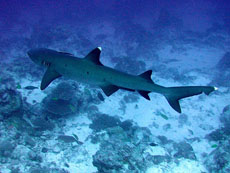Governance, socio-economic and political issues within the Maldives are reducing the ability of local, atoll and national management to address threats to coral reefs nationwide, according to a recently published study.
The extent of coral reef recovery following the 1998 and 2010 bleaching incidents was collaboratively studied by Reef Check, the Marine Conservation Society and Biosphere Expeditions, with the results recently published in the expedition report entitled “Little and Large: Surveying and Safeguarding Coral Reefs and Whale Sharks in the Maldives”.
“Given the severity of the initial catastrophic bleaching [in 1998], there has been a moderate to good recovery of corals in the central Maldives atolls… [however] most coral communities in the central reefs are still recovering from the massive bleaching event,” the study found.
Furthermore, human activities causing local environmental pollution and global climate change impacts are “suppressing recovery” from coral bleaching incidents for reefs nearer to “more heavily populated centres” as well as threatening sustainable “maintenance of the very corals on which the Maldives exist,” the report noted.
“[However] the potential for a full recovery of Maldives corals in many sites is good,” it continued.
The report identified numerous government and management shortcomings that exacerbate the threats impeding reef recovery in the Maldives, despite ongoing government efforts to establish Marine Protected Areas (MPA) as well as reduce carbon emissions nationally and internationally.
Governance problems must be addressed if the Maldives is to achieve UNESCO Biosphere Reserve status for the entire island nation, the study emphasised.
Governance shortcomings harm reef resilience
Political instability and the recent economic downturn in the Maldives have shifted immediate priorities away from marine conservation, according to the report.
“Unfortunately, the monitoring budget for the [Maldives] Marine Research Centre (MRC) appears to have been drastically cut in the recent past, with little information coming out of the MRC in terms of reef conditions,” noted the study.
There is also “inadequate investment in enforcing” environmental conservation laws, particularly in MPAs.
“Enforcement has been undervalued as a net contributor to the nation’s wealth, because economic returns from such an investment are not easily apparent or quickly attainable,” the study explained.
Inadequate reporting of rapid environmental degradation was a key concern highlighted in the study, because this destruction has “degraded the natural capital of the islands and the reefs that support local and tourist islands.”
 Reefs have been “heavily modified” over the past 30 years – due to the lack of “concurrent precautionary management” – as “resource exploitation has expanded to meet the demands of an increased human / tourist population,” the report added.
Reefs have been “heavily modified” over the past 30 years – due to the lack of “concurrent precautionary management” – as “resource exploitation has expanded to meet the demands of an increased human / tourist population,” the report added.
Education and awareness regarding sustainable reef management is lacking, as balancing environmental resource extraction with protection is not included in the national curriculum, according to the report.
Meanwhile, business and tourism remain heavily dependent on a carbon-based economy due to the Maldives’ geographic remoteness, the study noted.
Given that the “Maldives’ islands are entirely, naturally made from the fine coral sand washed up onto the very shallowest coral platforms, with the highest point reaching approximately 2.4 meters above sea level” the study emphasised the importance of correcting these governance issues for reef protection.
Reef destruction threatens Maldives’ survival
Coral reefs play an unrivalled role in the Maldivian culture, lifestyle, and for fisheries relative to most other Indian Ocean states, in addition to supporting an expanding tourism and recreation industry, noted the study.
Human activities such as “tourism, reef fishing, coral mining, dredging, reclamation and the construction of maritime structures and pollution represent most impacts on coral reefs,” the study identified.
Overfishing of keystone species that are important for keeping reef predators in check, as well as inappropriate atoll development, sedimentation, and pollution were also identified as key threats.
inappropriate atoll development, sedimentation, and pollution were also identified as key threats.
Climate change induced impacts including sea surface temperature increases and seawater acidification from increasing concentrations of atmospheric carbon dioxide are, respectively, leading to coral bleaching as well as decreased coral skeletal strength, growth rates, and reproductive outputs. Carbon dioxide levels in the atmosphere need to be reduced to less than 350 parts per million, the report noted.
The mutually reinforcing combination of these threats will have “detrimental consequences” for the Maldives unless national and local government, tourism, and local island groups manage the local and global impacts threatening reefs, the report emphasised.
“Only with the development of capacity-building, training and resources committed to conservation at the local atoll and island level will mitigating measures be implemented,” stated the study.
Proactive island level sustainable environmental management is essential for coral reef health and recovery from previous “catastrophic, massive bleaching”, the report recommended.
This includes establishing and promoting sustainable fisheries that protect species from overfishing, including enforcing and expanding “no-take zones” for one in every three reefs, particularly around grouper spawning locations.
“Pollution must [also] be tackled” to prevent algal growth, which harms reef health.
The study concluded that “local islands, their political administrators and resorts should adhere and enforce these environmental standards, where possible, in order to stave off the most severe detrimental effects of climate-driven change to the health of the reefs.”